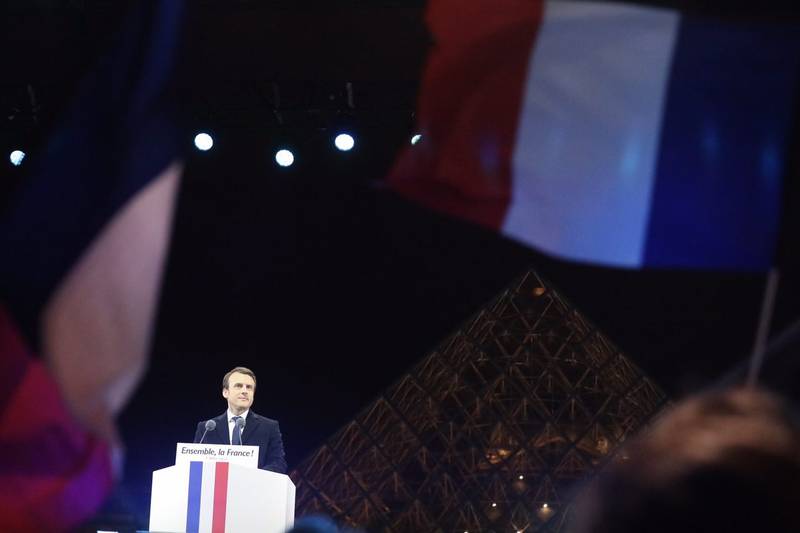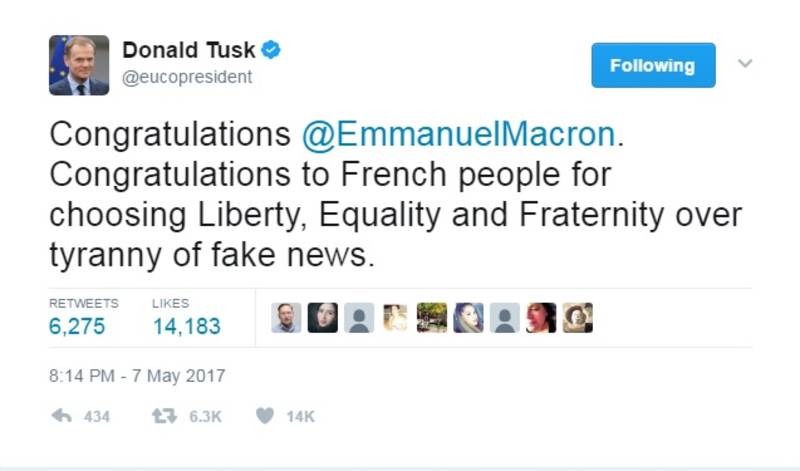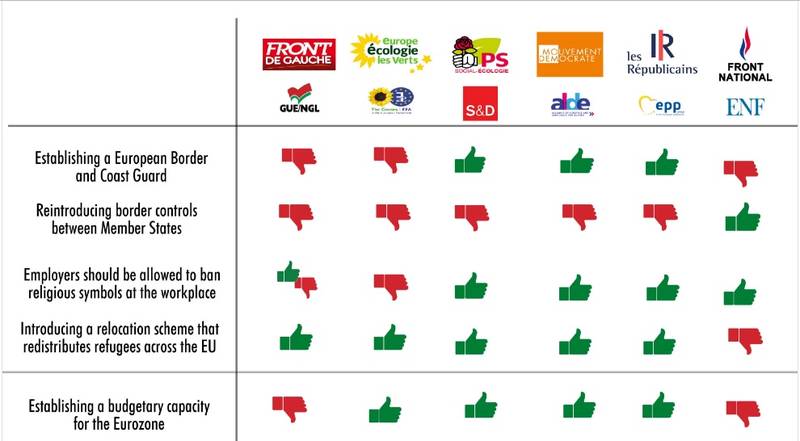After the Brexit - the Big Return of France?
Adelina Marini, May 9, 2017
 Winning the ideologically highly contested elections in a key member country with a strong pro-European agenda against the prevailing Eurosceptic background and versus a strong anti-European candidate, enjoying support of an outside and hostile to the EU country, is definitely a spectacular victory sealed with the Ode to Joy. This part of Beethoven's Ninth Symphony had to be the official anthem of the EU, but the idea was rejected precisely in France in the 2005 referendum on the European Constitution. In this sense, it is no coincidence that the newly elected French President Emmanuel Macron, in the European section [in French language] of his election programme, mentions 2005 as the beginning of a "lost decade", during which the feeling of distancing from the EU developed.
Winning the ideologically highly contested elections in a key member country with a strong pro-European agenda against the prevailing Eurosceptic background and versus a strong anti-European candidate, enjoying support of an outside and hostile to the EU country, is definitely a spectacular victory sealed with the Ode to Joy. This part of Beethoven's Ninth Symphony had to be the official anthem of the EU, but the idea was rejected precisely in France in the 2005 referendum on the European Constitution. In this sense, it is no coincidence that the newly elected French President Emmanuel Macron, in the European section [in French language] of his election programme, mentions 2005 as the beginning of a "lost decade", during which the feeling of distancing from the EU developed.
The victory of the 39-year-old newbie on the French and European political arena is a powerful counter-strike against Eurosceptic powers that have been forecasting the end of the European project for years and are working diligently, often with external financial and media support, to undermine it. In this spirit was the congratulations message to Emmanuel Macron of European Council President Donald Tusk on Twitter: “Congratulations to French people for choosing Liberty, Equality, and Fraternity tyranny of fake news”. European political stage veteran Jean-Claude Juncker, leader of the European Commission (Luxembourg, EPP), also congratulated the French on choosing a European future.
How does Macron see the European future?
There are some very specific ideas in Emmanuel Macron’s European programme, some of which are already being worked on at the European level, others are still only in the form of a vision, and the third group are entirely new. On the most sensitive issue for the EU in the last 2 years - the refugee crisis - Mr Macron intends to offer his EU partners the reinforcement of the European Border Police by empowering it to monitor and protect the external borders. The aim should be to mobilise 5 000 policemen from the new European Border and Coast Guard Agency. It is also proposed to create specialised crossing points in the main countries of origin of migration or transit countries where, with European assistance, the documents of those wishing to come to Europe would be handled. This measure, according to the programme, will help a lot in combating refugee traffickers and ease the return of migrants who are not eligible to remain in the EU.
Emmanuel Macron has several strong ideas in the field of defence. At the moment, this is one of the topics on which a major integration step is taking place in the EU. The French leader proposes the creation of a European Defence Fund, the idea of which is already being discussed at European level, since in November last year the European Commission proposed its creation as part of the concept of a defence alliance that would not duplicate NATO capabilities, but at the same time should ensure EU autonomy from the US. The aim of the fund is to finance investments in research and the joint development of defence equipment and technologies.
In the draft budget for 2017, the Commission proposes to set aside € 25 million for defence research and hopes that by 2020 this part of the budget will reach € 90 million. For the next programming period, the EC intends to propose a separate defence programme worth € 500 million a year. Another objective of the fund is to assist participating countries in the joint purchase of defence equipment such as drones or helicopters. The EC believes it is possible to mobilise € 5 billion per year for this purpose, but the amount is still too unrefined. The EC is about to fine-tune it after a thorough analysis.
Emmanuel Macron's programme on the topic shows that he stands fully behind these ideas, but there are also new ones, such as the creation of a specialised European Security Council, which would gather military, diplomatic and intelligence leaders from the member states. In the spirit of Europe of many speeds, the programme proposes to create specific cooperation among member states on defence issues "without waiting for the participation of all the EU countries". It is not said explicitly, but it is obviously intended to work with the enhanced cooperation procedure. Macron also supports the idea of setting up a permanent European headquarters responsible for the planning and control of European defence operations in cooperation with the command centres of the member states and NATO.
An euro area economics and finance minister
There are two key proposals on economic affairs in the Macron programme. One is to create a budget for the euro area, as was provisioned in the five presidents’ report. The budget in the currency club must have three functions - investments for the future, emergency financial assistance, and response to economic crises. This means unifying in a single framework Juncker's investment plan and the euro area permanent bailout fund (the European Stability Mechanism), which operates outside of European law (it is a separate intergovernmental treaty). The second proposal is for the euro area to have a finance and economy minister responsible for the euro area budget. Such an idea already exists and it is being discussed as a possible option for the future of the European Economic and Monetary Union (EMU). What's new in the Macron idea is that this post will be responsible not only for finance, but the economy as well.
Macron also states his support for another idea adopted by the European Parliament - the euro area budget is controlled by a special euro area parliament that brings together MEPs from the countries participating in the currency club. The EP wants to avoid the formation of a separate euro area parliament because it believes that checks and balances can also be carried out by the current European Parliament, but only by the euro area members. In his program, Macron said he would demand the creation of minimum standards for European social rights, as declared in the EC's proposal for the European social rights pillar of 26 April
There are also several ideas in the programme that would certainly cause many disputes. Such is the idea of "Buy European" - a law that allows access to the European procurement market for companies, at least half of whose output is in Europe. Another idea is to create an instrument for controlling foreign investment in Europe in order to protect European strategic interests and sectors. This will be similar to the existing mechanisms in the US, China and France, the document says. Macron is known in international media as a globalist, but if one judges by his agenda, he has set himself the goal of tackling the side effects of globalisation.

One of his ideas is the creation of a European trade prosecutor to check that EU partners respect their commitments under trade agreements and, therefore, sanction them in the case of a violation, especially when it comes to social, environmental or fiscal measures. Another proposal is for the EU to require that all trade agreements it signs include provisions on tax cooperation and social and environmental standards. In this spirit, it is proposed to reduce tariffs for environmentally friendly products and services.
Among the other proposals in the programme of the newly elected French president is the creation of a European Venture Capital Fund to support European digital start-up companies. The fund must initially start at least € 5 billion. Macron also proposes to renegotiate the data protection agreement with the US until 2018 in order to ensure the protection of all Europeans' personal data. He also proposes the creation of a European Digital Trust Agency to deal with the regulation of large digital platforms so as to protect personal data.
Extract the maximum out of the Brexit
Macron suggests the seats of the 73 British members in the European Parliament to be included in European electoral lists. According to him, this can happen even for the next European elections in 2019 if the calendar of UK exit negotiations allows it. The idea of pan-European electoral lists is not new. In 2011, former British MEP Andrew Duff (ALDE) was a rapporteur on the subject in the European Parliament and suggested that 25 MEPs be elected from a single constituency formed by the entire territory of the EU. A similar idea also came out a year later from a group of member states, including France.
The Macron programme also proposes the creation of EU-wide democratic conventions by the end of the year to hold debates on the future of the Union. The ultimate goal is to draw up a short road map with the challenges and priorities for action, as well as a clear implementation calendar for the next five years.
 With these ideas, Emmanuel Macron makes a statement of returning France as part of the engine of Europe - a role that Francois Hollande never managed to play, thus considerably weakening French influence in the EU, placing Germany as the leader of Europe and the liberal world in general (especially after the election of Donald Trump). Germany itself feels uncomfortable in this role, and has also become the subject of attacks by Eurosceptic forces, who saw in this an attempt to restore German domination of the early 20th century. Emmanuel Macron is a new generation European politician, who could bring a new impetus to the European project. This will, however, depend on the outcome of the parliamentary elections in France next month.
With these ideas, Emmanuel Macron makes a statement of returning France as part of the engine of Europe - a role that Francois Hollande never managed to play, thus considerably weakening French influence in the EU, placing Germany as the leader of Europe and the liberal world in general (especially after the election of Donald Trump). Germany itself feels uncomfortable in this role, and has also become the subject of attacks by Eurosceptic forces, who saw in this an attempt to restore German domination of the early 20th century. Emmanuel Macron is a new generation European politician, who could bring a new impetus to the European project. This will, however, depend on the outcome of the parliamentary elections in France next month.
The importance of all this is very well shown in the VoteWatch report on the European positions of different French parties, based on how their MEPs voted in the European Parliament on key legislation dossiers.
Translated by Stanimir Stoev
 Federica Mogherini | © Council of the EU
Federica Mogherini | © Council of the EU | © Council of the EU
| © Council of the EU Luis De Guindos | © Council of the EU
Luis De Guindos | © Council of the EU